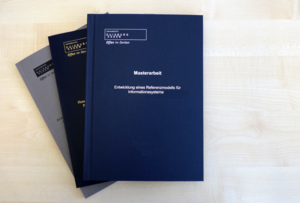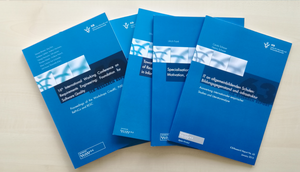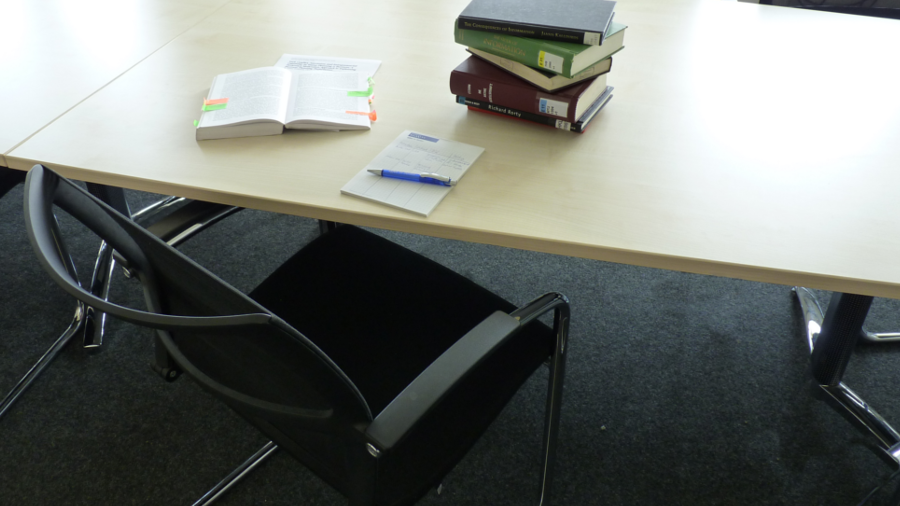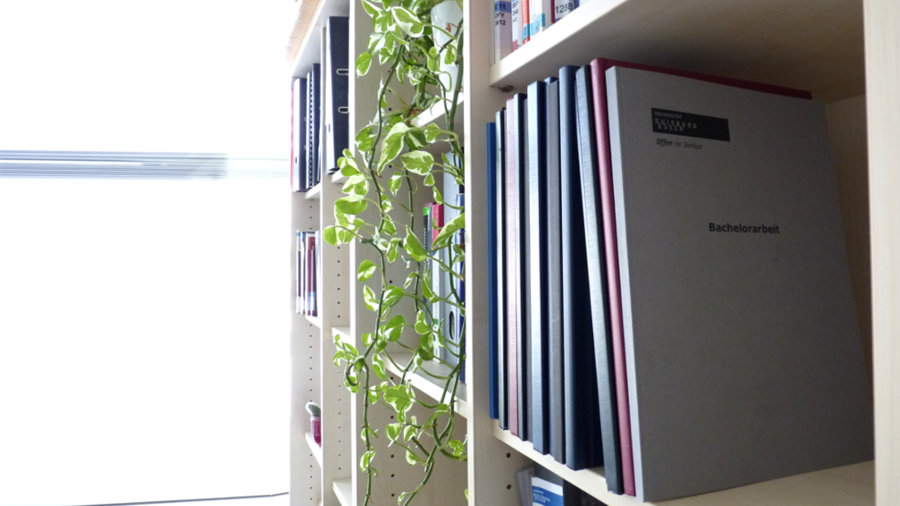Final theses

Your thesis gives you the opportunity to concentrate on a current research topic in the field of Business Information Systems. Supported by your supervisor you will extend your knowledge regarding scientific work and apply it so that you can write about complex topics in a comprehensible and well-structured way. In essence, a convincing motivation for the topic has to be developed, which leads to an easily understandable research question or research objective. Based on this objective, you should choose a suitable procedure that allows you to answer the research question in a way that is understandable for readers. In the concluding chapter, you can answer your research question and work out where the research topic itself and your own work offer further research opportunities.
Planning and writing a thesis
For your thesis, you should determine your areas of interest at an early stage and which research topics you are most interested in. Discussions with professors and research assistants can help you identify a suitable supervisor of your thesis and which research questions and research approaches are suitable for your work. Furthermore, faculty can offer inspiration by way of suggested topics and help identify which thematic possibilities are available to be the subject of final theses.
In addition to the formal guidelines, particular attention must be paid to the appropriate language when preparing the work. You should aspire to linguistic precision and clear argumentation, and to the fluency of the text , which should encourage the reader to read it. The bachelor's or master's thesis is therefore an important proof of a student's qualification. This is why a final thesis is a considerable effort. Success is not determined by the time spent writing the thesis, but upon the level of scientific knowledge exhibited.
Every qualification paper is an important part of the final examination. Therefore, some organizational regulations must be observed. The relevant examination regulations and announcements are available from the Central Examination Office.
The formal requirements for the structure and design of qualification work are documented in the guidelines for the preparation of scientific work in Business Information Systems(Leitfaden zur Erstellung wissenschaftlicher Arbeiten in der Wirtschaftsinformatik).
Literature research
For your literature search we recommend the following portals in addition to the services of the University Library and Google Scholar. Please note that complete access to the information is only possible via university computers or a network connection via VPN. Learn how to connect your home computer to the university network on the pages of the ZIM. If access to certain full texts is not possible, use the interlibrary loan service or contact the respective supervisor or lecturer as required.
| Web site | Description |
| ACM Digital Library | Digital library for ACM publications |
| IEEE Digital Library | Digital library for IEEE publications |
| Business & Information Systems Engineering (BISE) | Scientific journal of the discipline of Business Information Systems which was published until 2013 under the name Wirtschaftsinformatik |
| Scientific Literature Digital Library (CiteSeer) | Database of publications in Computer Science and Information Sciences |
| Computer Science Bibliography | Bibliography of publications in computer science, provided by the University of Trier, without full texts |
| EBSCOhost | US-American database provider with continuous literature databases and full text databases |
| JSTOR | Digital library for journals, books and primary literature |
| SpringerLink | Online library of Springer Verlag with scientific texts from various disciplines |

ICB's research reports
The ICB research reports published by professors and staff of the Institute of Computer Science and Business Information Systems offer an excellent insight into the numerous research areas of the institute. In addition to content orientation, the research reports also offer an insight into the science of Business Information Systems and the associated research methodological possibilities, as described, for example, in Research Report #7.
List of ICB research reports
Proposing your own topic
You can not only choose from one of the topics suggested, but you are always welcome to submit your own topic proposals. This gives you the opportunity to work on a topic that you find personally motivating. Your choice of topic can also be important for your future professional development as it can help you build your personal specialist focus. Besides the scientific requirement, the chosen topic should also fit the research areas of Business Information Systems at the University of Duisburg-Essen. Reviewing the research areas of the individual staff members or at the research reports of the ICB can provide a first orientation as to who might be a suitable supervisor.

Topic offers
As well as the possibility of suggesting your own topics, you can also choose from topic suggestions that can also be adapted and varied to your own interests in consultation with the supervisor.

Theses in process
Find out which topics are currently being worked on by fellow students. Besides an insight into possible topics, a discussion with the respective supervisor can help to identify further research questions and to concretize the approach to one's own thesis.

Completed theses
The overview of completed topics gives you an inspiring impression of possible topics for theses, but also gives you an insight into the history and research topics of recent years.
Further topics
Please note that in addition to the topic suggestions presented here, further topic suggestions may be available on the subpages of the chairs. In particular, interesting topic suggestions may also be available on the websites of the chairs in the fields of economics and computer science, which can also be worked on by students of business informatics. The Chair of E-Business and E-Entrepreneurship (NETCAMPUS) also assigns topics for final theses separately. Details can be found on the chair's website.
Copy & Paste allows you to create large parts of a qualification work in a quality that you do not believe you can achieve.
However, we warn you explicitly not to give in to such temptation. Using sources and not labeling them as such is a blatant violation of the rules of scientific work.
Those who ignore it not only betray the authors of the abused sources, they also try to gain an unfair advantage over their fellow students.
Those who do not allow themselves to be impressed by these indications should realize that there are risk is considerable:
If there is the slightest suspicion, any submitted qualification work is systematically examined for plagiarism using the specialized tools.
If the suspicion is substantiated thereafter, the work is evaluated without exception as "inadequate" (fail). In addition, the University reserves the right to take legal action against the offender.
